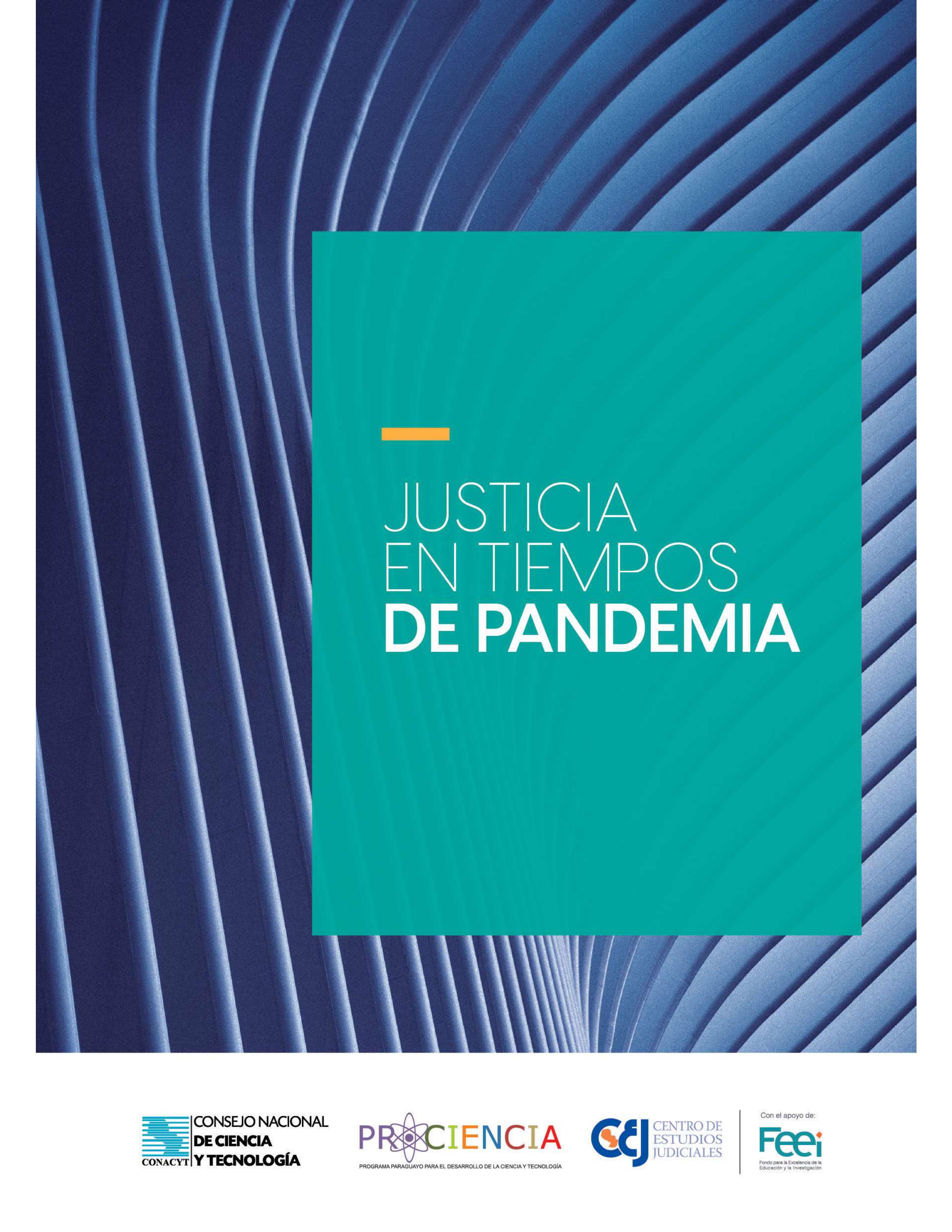Justicia en tiempos de pandemia
Share
Metadata
Show full item recordDate of publishing
2021Type of publication
info:eu-repo/semantics/bookSubject(s)
Administración de justicia
Aplicación de la ley
Derecho a la justicia
Pandemia
Procedimiento legal
Telemática
Administration of justice
Law enforcement
Right to justice
Pandemics
Legal procedure
Telematics
Aplicación de la ley
Derecho a la justicia
Pandemia
Procedimiento legal
Telemática
Administration of justice
Law enforcement
Right to justice
Pandemics
Legal procedure
Telematics
Abstract
El presente trabajo de investigación pretende contribuir al acceso a justicia en Paraguay, proponiendo a la Corte Suprema de Justicia acciones tendientes a preservar los derechos a un juicio justo en plazo razonable, evitando posibilidades de contagio y expansión del Coronavirus.
Se busca identificar los actos procesales de la gestión jurisdiccional, los actos administrativos y organizativos que sean potencialmente peligrosos para la propagación del COVID-19 en la sede central del Poder Judicial. A dicho fin, se efectuaron recomendaciones sobre aprovechamiento del espacio y algunos mecanismos para desarrollar los procesos, analizando no solo el marco legal y reglamentario sino también recogiendo prácticas de los operadores de justicia.
En el trabajo se tuvo especial énfasis en el ámbito penal y de la niñez y adolescencia y el uso de sistemas telemáticos en el proceso. En estos casos, donde además de los casos ya en trámite surgieron nuevas necesidades para responder a la situación de emergencia, pudo notarse que se debe continuar con la implantación del expediente electrónico en todo el país.
Proponiendo a la Corte Suprema de Justicia, acciones de contingencia en el marco de la pandemia del coronavirus que incluyan un modelo de intervención en materia de gestión jurisdiccional que implican cambios en el comportamiento de sus operadores y usuarios. Ko tembiapo kuaaha’ â rehegua, ja’éva investigación, oñeha’ â mbaite oipytyvô ñane retâ Paraguáipe oî haĝua tekojoja. Upevarâ omoĝuahê CORTE SUPREMA DE JUSTICIA-pe tembiapo oñangarekova’erâ umi tekomba’ére, hérava derecho, maymáva tapicha oguerekóva, peteî tekojoja ipya’emíva ani haĝua ova hese pe mba’asy vaiete hérava CORONAVIRUS.
Hi’â ojekuaa umi mba’e vai oporomongyjyjéva ikatu rupi ova tapicháre pe COVID 19, PODER JUDICIAL ryepýpe, ko’â tembiapo hérava Administrativo ha Organizativope ĝuarâ.
Pevarâ ojejapo heta ñemoñe’ê ha tekombo’e ojeporu haĝua hekopete tenda ha mba’ekuaa oje desarrolla haĝua proceso oje’eha, ojepy’amongeta marco legal ha reglamentario-re, ha upéicha avei ojehechauka opa mba’e
porâ ojapóva operadores de justicia-kuéra.
Ko tembiapópe oñemotenonde pe ámbito legal héravape, mitâ, mitârusu ha mitâkuña guasúpe oñepytyvô haĝua. Ojejuhu tekotevêha oñeme’ê peteî mbohovái umi tembiapo ñepyrumby ha avei umi situación de emergencia ipyahúvape, ojehechakuaa avei tekotevê ha ojeporu expediente electrónico ñane retâpýre.
Oñemoĝuahê CORTE SUPREMIA DE JUSTICIA-pe heta ñemoñe’ê Contingencia Coronavirus rehegua oguereko haĝuáicha peteî tekoapy oipytyvova’erâ operadores ha usuarioskuérape omo ambue haĝua hekovekuéra. This research aims to contribute to facilitate the access of justice in Paraguay, proposing the Supreme Court of Justice different actions in order to preserve the right to a fair trial in a easonable delay, all with avoiding the possibilities of contagious and expansion of Coronavirus.
We look for to identify the steps in the procedure in judiciary process, administrative acts and organization directives that are potentially dangerous for the growth of Covid in the central building of the Judiciary.
In this level, we made recommendations about the use of the space and some mechanisms to develop the process, analyzing not only the legal and reglementary framework but also collecting good practices of the people who work in the Judiciary.
In this investigation we had special emphasis in the criminal and child and adolescence field, as well as the use of telematics systems in the process. In these jurisdictions where besides the ongoing cases new exigencies appeared in order to answer the situation of emergency, we can note that the utilization of the electronic system to treat judicial cases shall continue.
We propose the Supreme Court suggestions during the Coronavirus pandemic that include a model of intervention when managing the cases that involves changes in the conduct of the Judiciary workers and the users.







